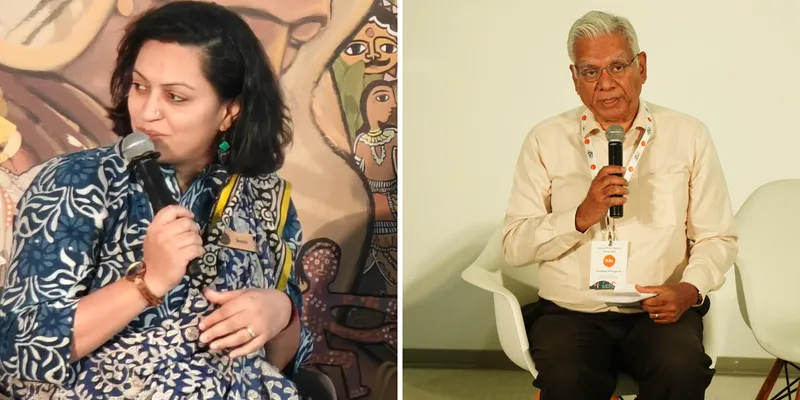How Social Compact is bringing contract workers’ voices to boardrooms
Social Compact is a multi-stakeholder platform where industries and NGOs co-create solutions to improve the conditions of contract workers.
"If a full day’s work can’t get generations out of poverty, what will?” asks Sonvi Khanna – Lead at Social Compact, a multi-stakeholder platform that works with industries, corporates and NGOs towards systemic changes for the rights of contractual workers.
According to Khanna, India has about 200 million contract labourers, and with little to no growth opportunities, these workers are easily replaceable.

Sonvi Khanna and Pradeep Bhargava
The story of Social Compact began five years ago when India went under a lockdown to prevent the spread of COVID-19 pandemic. Overnight, thousands of migrant workers had to leave cities for their hometowns. The exodus laid bare the harrowing realities of these labourers.
Industry leaders such as Farhad and Rati Forbes, Meher Pudumjee, Anu Aga, and Pradeep Bhargava, with NGOs Dasra, Aajeevika Bureau and Centre for Social Justice started Social Compact
Informal contractual workers perform essential operations for big companies and industries. They work as construction workers, security guards, industrial labourers, cleaning staff and more. Even if their employers are formal sector companies, poor wages and lack of social security continue to affect these workers.
Social Compact began its work as a team of 10-12 members in 2020 when news of migrant workers travelling by foot amid lockdowns was making waves. Based in Mumbai, the industry leaders and nonprofits together wanted to create an ecosystem to protect the rights of contractual workers.
“Most of these workers earn enough to get by at a decent time, but not enough to cushion themselves in a crisis. They also do the most dangerous jobs without adequate equipment.” says Khanna.
Social Compact aims to address these concerns, along with gender parity among informal workers. A multi-stakeholder approach with various companies helps revise company policies and implement on-ground systems across India.
The process
“We spent three years talking to companies and trade unions. While they listen, this is just considered the reality of workers” says Pradeep Bhargava – Chairperson of Social Compact.
“The white collar employees and CEOs are protected by laws and policy, but factory workers are not. Organisations do take care of people they consider resourceful, so why not do the same for your workers?” Bhargava adds. In the past, he has served as the president of MCCIA – the Mahratta Chamber of Commerce, Industries and Agriculture and has been advocating for socially responsible company policies for years.
Social Compact is incubated with Dasra – a nonprofit, and has Aajeevika Bureau and Centre for Social Justice as founding members.
Khanna explains as the first step of the process, companies fill out a questionnaire of 80 indicators, which identifies and highlights the contractual workers’ needs.
Social Compact then visits company sites, engages with worker representatives, and works with the companies to come up with specific recommendations.
“If there are 100 people working full time for any company, between 50 and 70 of them will not be on the payroll. They're on other external security, housekeeping or canteen payrolls. That is why policies become important for systemic change,” comments Bhargava on existing payroll policies that companies follow.
Access to government scheme entitlements is another identified concern, as workers would have to miss a day’s wage to go to government offices. Aajeevika and Centre for Social Justice set up worker facilitation centres in seven industry hubs in Pune and Gujarat, to help them register for schemes such as PAN card, e-shram and Jan Dhan , so that workers do not have to travel and miss work.
Way forward
Social Compact has worked with 60 companies across India over the last five years. This includes manufacturing, construction, fashion, family-owned businesses and corporates. Their efforts have triggered changes in improving working conditions, robust documentation, setting up grievance redressal mechanisms, and other systemic changes, for 6 lakh workers.
“Initially, people would ask what we’re talking about, and what is going to change for the people. But even white collar workers were just clerks working under one business owner 30-40 years ago. If their situation could change so much, why can’t it for these contractual workers?” says Khanna.
Both Bhargava and Khanna agree that large-scale change will take time to be visible. For the team, success is measured if company policies are changing, and gaps are being addressed.
Thermax, one of the companies part of the initiative, now has an effective listening loop system in place through which contractual workers report concerns and ask for support. In another company, workers have also spoken about a thousand rupee increase in monthly wages, which has helped them sustain their earnings and reduce expenditure on necessities and food.
Bhargava also comments that the team is in this for the long haul. “There are compassionate leaders. Existing companies act as models for others,” he adds.
Edited by Affirunisa Kankudti






